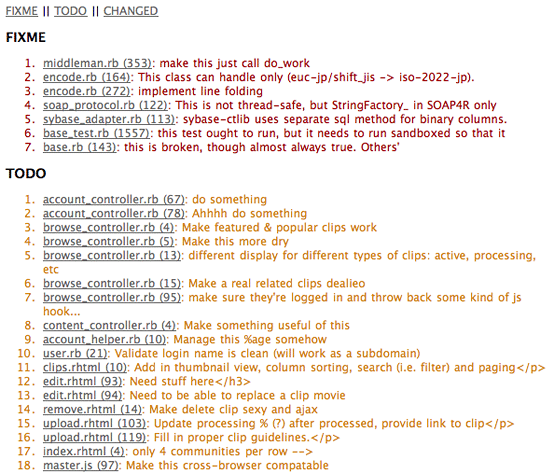If you use TextMate, you should really think about using the TODO bundle more often. It’s a simple, low-maintenance bundle that adds tremendous value to your code.
Setting TODO, FIXME, and CHANGELOG
Using the bundle is pretty easy. In any language, just type in a quick comment with the prefix TODO, FIXME or CHANGED like so:
def view
# TODO: different display for different types of clips: active, processing, etc
@clip = Clip.find(params[:id])
# TODO: Make a real related clips dealieo
@related_clips = Clip.find(:all, :limit => 6, :conditions => ["clips.status = 'processed'"])
end
Using this syntax lets you keep pushing ahead at full steam and leave the hard stuff for later. For example, in the above example I wanted to get a quick functional prototype out the door. It wasn’t mandatory that the Related Clips actually be related: it was only mandatory that there was content present.
You can also use the keywords FIXME or CHANGED throughout your code, like so:
def view
# FIXME: This totally breaks if an invalid ID is given
@clip = Clip.find(params[:id])
# CHANGED: @related_clips now uses a model method related_clips
@related_clips = Clip.related_clips(params[:id])
end
This lets others working on the code let you know that you know something is broken and/or changed, but you just don’t have time to get to it.
Getting the information back
Well, that’s all fine and well.. but how do you know what needs to be fixed/changed/done ? Just hit Ctr+Shift+T and TextMate will pop up with a pretty little list, hyperlinked and all
 Ctrl + Shift + T brings up a list of all your todo's
Ctrl + Shift + T brings up a list of all your todo's
I use this bundle practically every time I open up Textmate. It allows me to keep on a focused track of development, while still keeping a lot of “ooh, I need to do that sometime” kind of tasks on the radar.